Why Underwater? Ten Important Reasons I wrote The Rise of Oceania, and a Message for the Future

(Note: I watched the events involving the submersible Titan in the Atlantic closely over the past week. It was a tragic and yet avoidable disaster. James Cameron, on CNN, spoke about how similar it was to the Titanic sinking in 1912. He couldn’t have been more correct. Despite warnings, the captain pressed on to the inevitable end. I am saddened by the loss of five lives and it is a sign to explorers everywhere that the ocean is merciless. Pressure is inexorable. Engineering needs to be perfect to descend to depth, and if problems appear, there is often very little time (or none at all) to solve problems on the spot. Since I began writing The Rise of Oceania, events have tended to mirror my predictions. The increasing tensions with China, for example, the growing climate crisis on the surface, and more. I wrote the below article only days before Titan went silent. I’ve added this note to acknowledge the dangers and the loss of life last Sunday. — TSJ, 26 June 2023)
Over the past six years, I’ve been working almost exclusively on the series, The Rise of Oceania. It started with The War Beneath, a book I first conceptualized in the early 1990s as a student at the University of Western Ontario. At the time, I was studying environmental systems, Geography, Geophysics, and Geology. Most classes seemed to involve discussions of Global Warming and ocean level increase. I wrote the book in 2008 and it attracted a publisher in 2016. Now, only a few months from the release of A Blanket of Steel, the sixth and final installment, I’m reflecting on some the reasons why I wrote the series.
I sometimes describe The Rise of Oceania as “James Bond underwater.” It’s a quick and easy way to explain what it’s about. It’s full of espionage and action, involving spies and missions to steal secrets, all in a unique setting. It takes place during a Cold War between superpowers. In this way it is very similar to Bond, especially at the height of the Cold War in the 1970s and 80s. It takes place in habitats, modules, settlements, cities, domes, submarines, submersibles, SCUBA, and seacars. In this way, the series of technothrillers is unlike other espionage thrillers.

But what genre are these books?
Science fiction? Absolutely. The series takes place in the 2100s and involves technology, but more important, it’s grounded in reality and uses science to explain how (and why) my characters are colonizing the seafloors. Also, how they fight wars, and with what weapons. Think Sphere, by Michael Crichton, or James Cameron’s The Abyss.
Are the books thrillers? Yes, definitely. They’re full of underwater battles, hand to hand combat, wars, death, adventures, and murder.
Are they espionage stories? Totally. They involve spycraft and assassination, either through stealth or otherwise.
Is it climate fiction, or cli-fi? Yes. It involves this, without much question. The setting is the result of climate change on the surface, but the characters don’t dwell on this. They’re living their lives and struggling to survive in their world. They don’t really care what’s happening on the surface, however. It’s unimportant to them. They’re fighting the superpowers with innovative weapons and strategies. It’s David vs. Goliath and they don’t care much about the climate catastrophe happening on land. Interestingly, at the time I conceived the first book and came up with the idea of the entire series, I didn’t even know what “climate fiction” was. I just had the idea of thrillers that took place underwater. I thought it was a great idea, and I set out to write it. The first book was easy to write. It grew more difficult as it went on, but the final book, A Blanket of Steel, brings it all to a compelling and action-packed close. I’m so proud of it.
But why did I pick the oceans and not outer space, where most authors set colonization stories?
Here’s a list of the top ten reasons. I hope you enjoy them.
1. The oceans are easy to access
Our largest cities are on shorelines. These cities are most threatened by climate change, but are also superb “jumping off” points, or gateways, to the new world, to use a term Frederik Pohl might prefer. Most authors might write about mining asteroids, other planets, or capturing comets for new resources. That will happen, centuries in the future. But for now, in the next few decades, the most realistic options are the oceans, where there is untold wealth. The mineral resources found in polymetallic nodules are simply jaw dropping, and most of it is lying on the ocean floor. No digging needed. We have to overcome the pressures, but it’s far, far easier (and cheaper) than going to outer space.
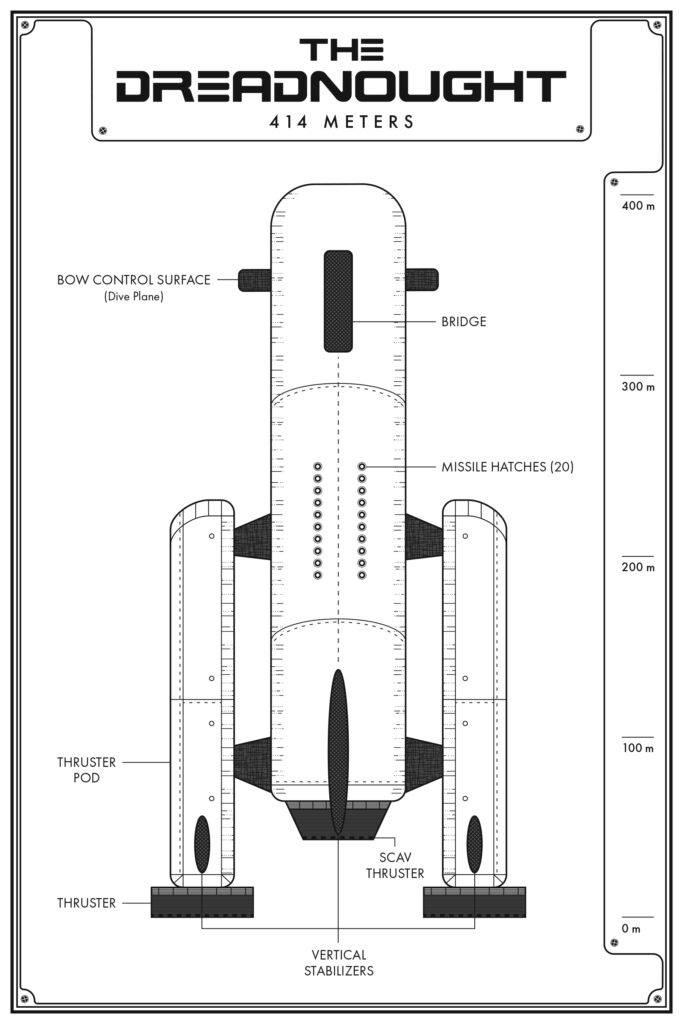
The Dreadnought, from Fatal Depth by Timothy S. Johnston. Schematic by Cheyney Steadman.
2. 70% of the Earth is underwater
It’s funny that few people consider the wealth in the oceans. To many, the blue areas on the globe aren’t worth much thought. The oceans cover enormous geologic features and incalculable mineral wealth. The largest mountain range on the planet is underwater — the Mid-Oceanic Ridge, which is nearly 70,000 km long. Remember when the stolen commercial aircraft MH-370 disappeared? It is likely lying among massive mountain ranges and ridges, to the west of Australia and underwater. A search team was unable to locate it in the search area … and it was a relatively tiny swath of the ocean floor.
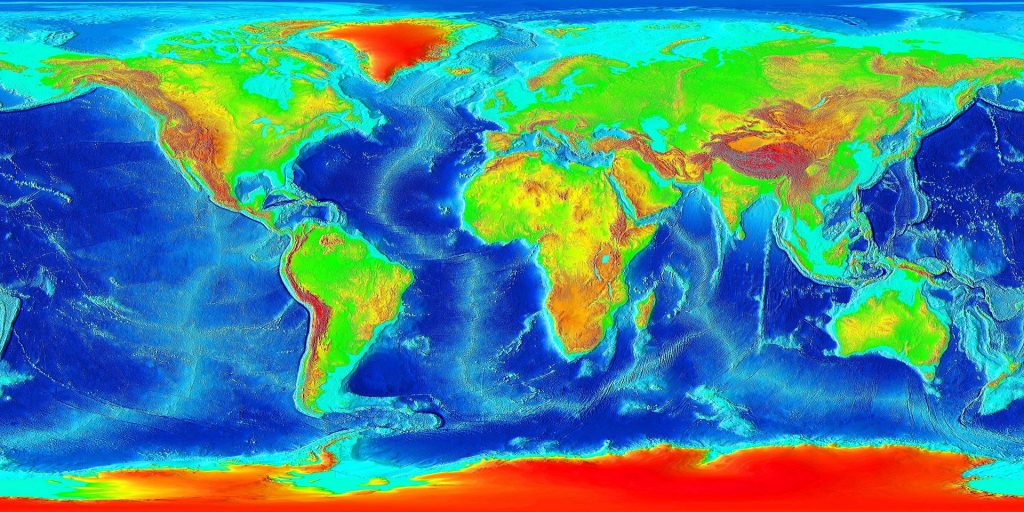
Note the Mid-Oceanic Ridge between South/North America and Africa/Europe.
Map in the Public Domain.
3.The fertile shelves equal the size of Asia
Imagine a continent the size of Asia without people. One that’s fertile and full of great resources to extract … they are potential sources of huge profits. One that people don’t even know exists! They can’t see it when they look at the globe, because it’s under those blue areas. The continent is just off your coastlines, on the shallow shelves, easy to reach and well within current technologies to live and work on. Why not take advantage of this, now?
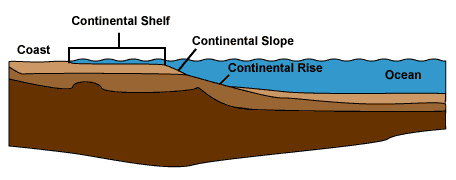
The continental shelves — or the fringes of landmasses — around the world equal the size of Asia. They are shallow, fertile, and easy to access.
4. It’s currently more realistic (and cheaper) than asteroids/The Moon/Mars
Colonizing the ocean floor will of course cost money, but it’s right outside our doorsteps. Getting materials (and people) to outer space costs a hell of a lot more. As SpaceX and NASA and other companies work to build cheaper systems to get to orbit, why neglect what’s right in front of us? Other nations are developing fish and farming off the coastlines. Some nations already make use of kelp in their diets. This will become important as Global Warming destroys cropland on the surface. But underwater there is the opportunity to farm large areas that produce rapidly-growing crops. And, as mentioned above, the mineral resources are there for the taking, lying on the seafloors near geologically active regions. I wrote about polymetallic nodules here. In some areas, there are 75 kg of these mineral nodules per square meter, scattered about the ocean floor in the deep abyssal plains. They consist of iron, manganese, and other important metals, and are the size of gravel or potatoes.
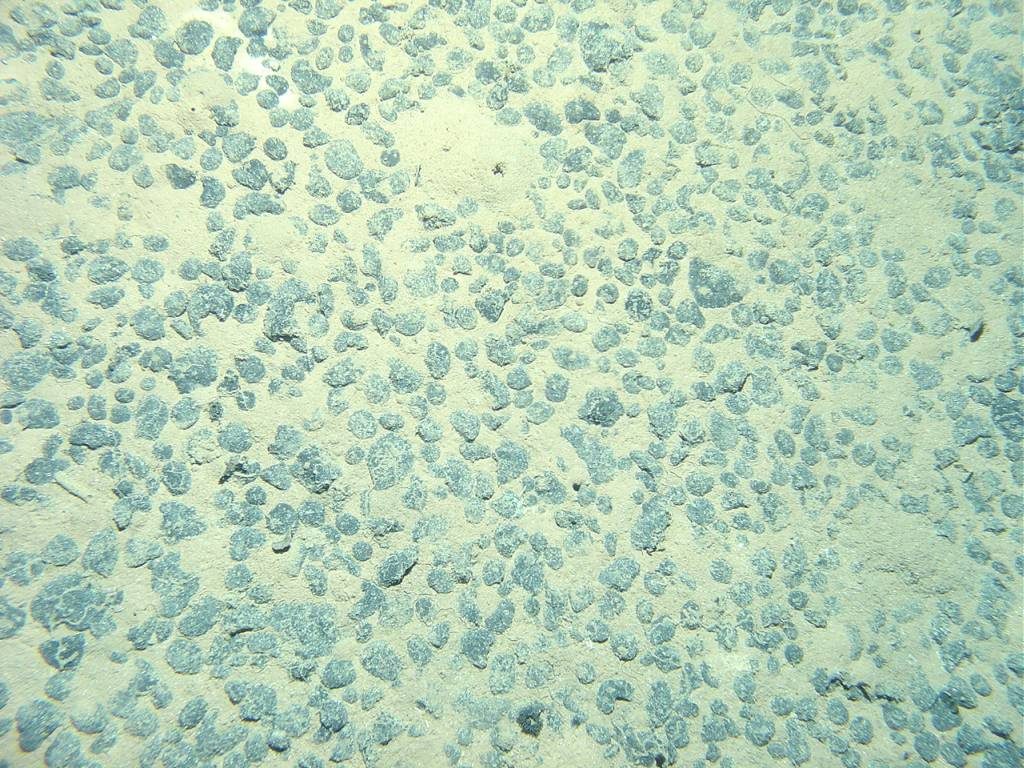
Nodules on the ocean floor.
5. Kelp grows a meter a day under the right conditions
Think about that for a second. Imagine a crop on land that can grow one meter each day. The closest I can think of on land might be bamboo, which can grow 30 cm a day. They say if you are in a bamboo forest, you can hear it creak as it grows. But people can’t eat bamboo! Kelp forests are exploding in some areas as ocean temperatures change. Scientists recently discovered new areas in the Arctic and off Australia’s west coast. Imagine how many people that might feed. Let’s make use of these resources, instead of complaining about climate change. Mitigation is impossible, because the change is inexorable. But we can adapt … and we can create jobs and earn profit from it.
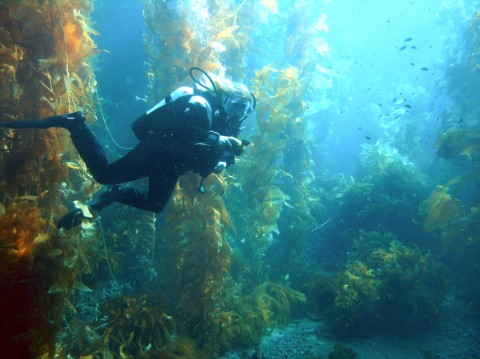
Kelp forest.
6. Global warming will not have a major impact on us underwater
The oceans will warm a bit, affecting where kelp grows and where fish/mammals migrate. Storms on the surface will grow worse, as we’ve witnessed, and the waves will churn a bit lower in the shallow areas near shorelines. Surface erosion will increase. But in the grand scheme, climate change will not have a major impact on the ocean floors, especially the deep ocean plains where the vast mineral resources wait.
7. We already have the technology to exploit the shelves
Pressurized modules and domes will do the trick. People have already experimented with living under pressure. In The Rise of Oceania, all living areas underwater, including submarines, submersibles, domes and cities and travel tubes, are pressurized at four atmospheres, which perfectly balances pressures thirty meters underwater. This interior pressure will resist the ocean pressures outside, allowing us to build and live on the continental shelves. The biggest drawback is that people can’t swim to the surface in an emergency … dissolved gases in their tissues will expand and cause The Bends. This, however, makes my series of thrillers more intense, and I’ve enjoyed incorporating this tension into my books. Characters have to solve problems on the spot or risk death. Adventures underwater are thrilling.

Trieste, off the coast of Florida on the shallow ocean floor. From The Rise of Oceania Saga by Timothy S. Johnston, schematic by Cheyney Steadman.
8. It will provide jobs
Imagine the jobs! Farming the shallow ocean floor. Creating fish farms, underwater, feeding and harvesting and solving problems. Shipping the produce to the land nations. The economy would grow with an entire new continent of resources moving toward the mainland. The shelves are a massive, untapped area of our countries that we are barely making use of. There’s currently some oil and gas mining going on, as well as fishing from surface boats. In some areas of the world there are shellfish and kelp farms underwater. We need to expand this in the West, because as climate change affects our economies, we can balance the effects by tapping into new resources in the oceans and providing jobs in the process.
9. Why import food when we can grow it ourselves (underwater)?
As climate change causes famine on land, as cropland dries and stops producing crops, we tend to import more food to make up for the losses. Why? Why not develop new farmland and pay our own citizens to work it? It seems normal enough to me, and this helped inspire my series. In The War Beneath, the first book in The Rise of Oceania, my protagonist, Truman McClusky, is farming kelp in the underwater colony, Trieste, just off the coast of Florida. He’s a former spy, however, and gets caught up in an adventure that launches the entire series.
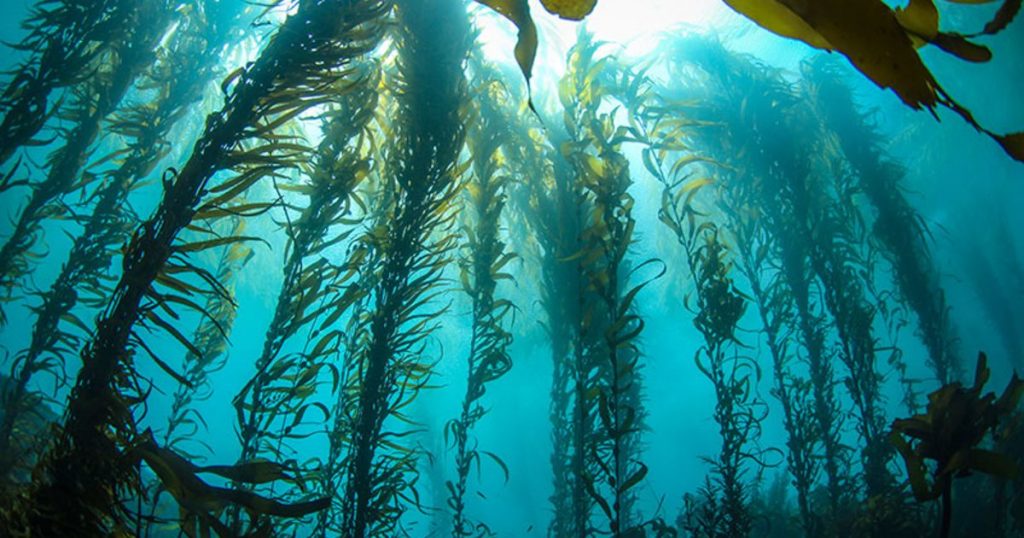
10. We need to start now before it’s too late
Seven of the hottest years on record occurred in the last decade. Let that sink in for a moment. Climate change is real. It’s happening. I have been alive for over fifty years, and winters have changed during that time. If we wait until grocery stores have empty shelves and masses of people start going hungry, we’ll solve the problems, but it’ll cost a fortune and put our economies at risk and people under enormous stress. If we start now and prepare for the inevitable, it’ll cost less, produce jobs, and possibly save us in the years to come.
In summary, and to put it simply, the end result of climate change could take two possible paths:
A. Flooded shorelines, millions of refugees, destruction of cropland, starvation and famine, war, rebellion, death, trillions of dollars in losses, eventual dictatorships.
B. Colonizing new areas, developing new cropland, mining new resources, providing jobs, adapting to new environments, shipping resources to the mainland, and growing economies.
Which path would you choose?
— Timothy S. Johnston, 26 June 2023
TSJ’s Awards
Follow TSJ on Facebook
Follow TSJ on Twitter
Follow TSJ on Instagram
Enter TSJ’s contests here
———
A BLANKET OF STEEL IS COMING SOON! FALL 2023! WATCH THIS SPACE!
THE SHADOW OF WAR IS OUT NOW!
Watch THE EXCITING BOOK TRAILER HERE!
“The Shadow of War is a slambang thriller set in an all-too-plausible future. Fans of Tom Clancy and Michael Crichton will be spellbound.” — Robert J. Sawyer, Hugo Award-winning author of The Oppenheimer Alternative
“Johnston presents readers with a diverse set of characters, along with a complicated world for them to navigate. The novel shines when describing the technology, as when the characters discuss the beam weapon, nicknamed ‘The Water Pick’ … Fans of high-tech SF will enjoy the concepts and worldbuilding here …” — Kirkus Reviews
“Any good heist consists of three components: a team, a plan and something worth stealing. ‘The Shadow Of War’, the fifth novel in Timothy S. Johnston’s ‘Rise Of Oceania’ series, has all three … Johnston has written a thriller with hot-off-the-presses technology, edge-of-your-seat moments, separated into heart-pounding seconds, and characters who don’t always do what they’re supposed to.” — SFcrowsnest
“Johnston weaves an engrossing tale … it’s easy to highly recommend The Shadow of War as an outstanding and gripping sci-fi technothriller.” — Midwest Book Review
“I need to see Oceania on the big screen!” — FIVE STARS from Readers’ Favorite
“…a terrific read! Smart, thrilling, intriguingly plotted and, like all previous entries in Johnston’s ‘Rise of Oceania’ series, A-level entertainment. And that opening chapter—WOW! Page-turner is an understatement.” — Michael Libling, author of Hollywood North: A Novel in Six Reels and The Serial Killer’s Son Takes A Wife
———
TSJ’s Awards
Follow TSJ on Facebook
Follow TSJ on Twitter
Follow TSJ on Instagram
Enter TSJ’s contests here
Enter your email into the widget at the right to follow TSJ’s blog Life After Gateway.
THE WAR BENEATH: FIRST PLACE 2018 GLOBAL THRILLER Action / Adventure Category Winner, 2019 Silver Falchion Award Finalist, 2018 CLUE Award Semi-Finalist, 2019 Kindle Book Awards Semi-Finalist, & 2019 CYGNUS Award Shortlister
THE SAVAGE DEEPS: FIRST PLACE 2020 CYGNUS Award Winner, 2019 GLOBAL THRILLER Awards Finalist, 2022 Kindle Book Awards Semi-Finalist; 2019 CLUE Award Shortlister
FATAL DEPTH: FIRST PLACE 2021 GLOBAL THRILLER Award Winner, 2022 Silver Falchion Award Finalist (Best Action Adventure), 2021 CYGNUS Award Semi-Finalist
Praise for THE WAR BENEATH
“If you’re looking for a techno-thriller combining Ian Fleming, Tom Clancy and John Le Carré, The War Beneath will satisfy … a ripping good yarn, a genuine page-turner.” — Amazing Stories
“One very riveting, intelligent read!” — Readers’ Favorite
“If you like novels like The Hunt for Red October and Red Storm Rising,
you will certainly enjoy The War Beneath.” — A Thrill A Week
“If you’re here for thrills, the book will deliver.” — The Cambridge Geek
“… an engaging world that is highly believable …” — The Future Fire
“This is a tense, gripping science fiction/thriller of which Tom Clancy might well be proud . . . When I say it is gripping, that is the simple truth.” — Ardath Mayhar
“… a thrill ride from beginning to end …” — SFcrowsnest
“… if you like Clancy and le Carré with a hint of Forsyth thrown in,
you’ll love The War Beneath.” — Colonel Jonathan P. Brazee (RET),
2017 Nebula Award & 2018 Dragon Award Finalist
“Fast-paced, good old-fashioned Cold War espionage … a great escape!” — The Minerva Reader





